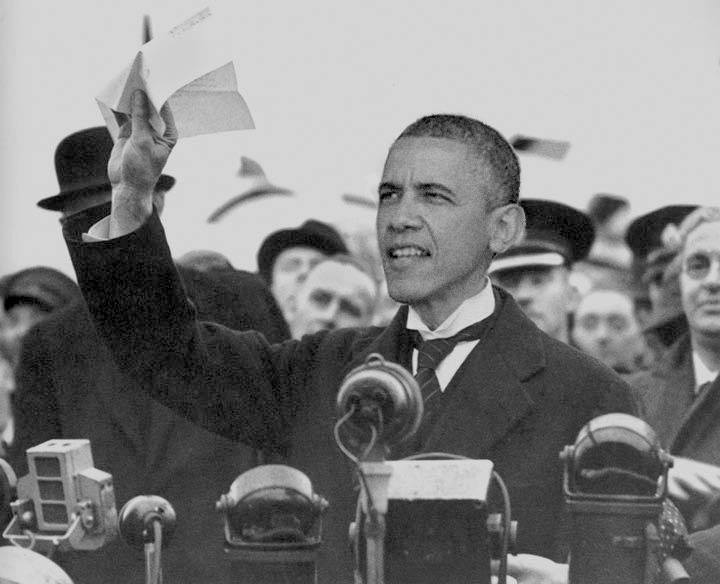The Middle East is on fire, and President Obama’s trying to put it out with a squirt gun.
The artificial deadline for a framework agreement over Iran’s nuclear capacity will end tonight · More and more former senior officials, including generals, are bashing Obama’s failed policy · The Iranians are in no hurry, and Obama has already proved that his “red lines” are meaningless · Obama will not abandon his legacy project, and the value of human life will continue to drop in the Middle East

The negotiations at Lausanne are reaching the critical point. But President Obama doesn’t seem particularly concerned; just last week one could see him golfing at Palm Beach. Does he know something we don’t? Maybe it’s the fact that the “deadline” of March 31 means nothing to the Iranians.
Iran’s Supreme Leader Khamenei openly stated a month and a half ago that he would support an agreement which would be single-staged and include both a framework and details. From this statement it’s clear that many more days will pass before the gaps at Geneva can be bridged, especially since Khamenei has also said that the agreement must not only be unequivocal but that the sanctions must be removed entirely.
We should remind our audience that the deadline of March 31 is not the end date for the Americans. Two “deadlines” have already come and gone, and there’s no reason to think things will be different this time around. Anyone who read Dr. Michael Doran’s Mosaic article on Obama’s Iran policy understands that the President will not easily abandon his legacy project, which began already from the beginning of his presidency in 2009. He’s simply too invested in it to back down now.
Everything is Predetermined
According to Benjamin Rhodes, a key figure in Obama’s inner circle, a nuclear agreement between Tehran and the United States and the Great Powers is for Obama not only “the best opportunity we’ve had to resolve the Iranian issue diplomatically,” but “probably the biggest thing President Obama will do in his second term on foreign policy.” He stressed that for the administration, “This is health care for us, just to put it in context.”
The Obama administration did nothing when Iran ruthlessly put down the pro-democracy “Green Movement” in the greatest public demonstration of opposition to the government since 1979. That same year, when it turned out that the regime did not meet the nuclear Nonproliferation Treaty and started building a nuclear facility in Fordow, Obama was forgiving. In 2011, he vetoed an Israeli air strike and in 2012, against the advice of senior members of his government, he refused to intervene in the Syrian crisis against the murderous tyranny of Bashar Assad. Both regarding Syria and Iran’s nuclear program, Obama repeatedly disregarded “red lines” he himself laid down. This trend continued in the beginning of his second term, when he opened up a dialogue channel with Ahmedinejad, which increased in activity all throughout 2013. In contravention of UN Security Council Resolutions, Obama continued to make concessions to the Iranians on enrichment.
Obama explained the logic behind his actions in an interview he granted at the beginning of 2014 to New Yorker editor David Remnick. Remnick explained Obama’s words as endorsing “a new geopolitical equilibrium, one less turbulent than the current landscape of civil war, terror, and sectarian battle.” By Obama’s lights, Iran is supposed to be a central player in this plan. Today, everyone understands that the opposite is true—the Ayatollahs have not changed, and their interventions have only increased ethnic strife, chaos and death in the region.
There’s an additional significant factor which was absent from Doran’s seminal article, but which strengthens his thesis and proves that the United States is abandoning its traditional allies. In recent weeks, with the deadline for a framework agreement with Iran fast approaching, Iran increased its oil exports. The United States and Europe have not been enforcing sanctions on this matter—meant to limit Iran to between a million and a million and a half barrels a day—for a while now. Korea, China, Japan, India, and African countries are all buying from them.
Removing sanctions would flood an already saturated market and drive down the price of oil. Such a situation can’t last for long, but the odds that Iran and Saudi Arabia will sit together at OPEC to fix prices are quite long. The fact that the oil inventory of the United States is the highest it’s been for 84 years only strengthens the assumption that the Gulf States will have to bear the brunt themselves. More than this: removing sanctions would also open up the gas market, and Iran could compete with Russia and with Saudi Arabia for the Asian market, primarily for India and China. The big winner will be the United States.

The Sunnis Go On the Offensive
Last month, Obama’s former envoy to the Middle East Martin Indyk penned a long article for the Brookings Institution (which he heads), and sharply criticized American policy in the region. This perspective stood out among the many critiques of Obama’s policy from former officials. He broke down the Obama vision piece by piece:
However, it is fanciful to imagine that the United States could convince Iran to shift from the region’s most threatening revisionist power and become instead a partner in establishing a new order in the Middle East. It would require the Supreme Leader to overcome his extreme paranoia about the intentions of the United States and curb the Iranian Revolutionary Guard Corps and the Ministry of Intelligence and Security—the regime’s mechanisms for pursuing its regional hegemonic ambitions. Any attempt at such a condominium would earn the United States the wrath of its traditional allies, Saudi Arabia and Israel, and their supporters in the Gulf Arab states and the U.S. Congress, respectively. Feeling betrayed, they would likely go their own way, acting without regard for U.S. interests.
The events of the past week proved him right. Saudi Arabia pulled a brilliant move in swiftly acting to end Houthi aggression in Yemen on their southern border and prevent these Iranian proxies from taking over the country. This is a productive move in a number of respects. First and foremost, it repels the Iranian pincer movement and its attempt to take over the Bab al-Mandeb Straits, the gateway to the Red Sea. Second, this is a clear flexing of muscles meant for Iranian and American eyes, making clear that Saudi Arabia will not sit tight and may even start its own nuclear program. Third, after a period of weakness during the illness of former King Abdullah, Saudi Arabia has reasserted its position at the head of the Arab-Sunni world, uniting them in a broad military coalition including Egypt. Finally, Saudi Arabia has put America in an awkward place, as the latter is now conducting a bombing campaign to help Shiite militias in Iraq against ISIS and now must support a Sunni campaign against Shiite forces in Yemen.
Indeed, the criticism of America’s incoherent policy was not long in coming. After a series of very sharply critical articles in America’s leading journals (see, for instance, David Rothkopf’s article in Foreign Policy), Lt. Gen. Michael Flynn, former head of America’s DIA (under Obama, mind) joined the chorus this Sunday. Flynn told Fox News that “at the end of the day, we have just this incredible policy confusion — never mind what our strategy is to execute that policy,” Flynn said. “We have to stop what we’re doing and take a hard look at everything going on the Middle East because it’s not going in the right direction.” Flynn argued that Iran is aiming to embroil the region in a sectarian war and even called Obama’s approach “willful ignorance.”
In light of the above, we can honestly state that Flynn has it wrong. The Middle East and much of North Africa is certainly collapsing into violent chaos, but Obama is certainly not acting out of ignorance so much as deliberate action.

A Palace Rebellion
Ostensibly, the sole purpose of the soon-to-expire deadline is simply to show the world and America that “progress” has been achieved. Yet Congress continues to signal dissatisfaction, although it is still not unified enough to bring out the big guns. Although many Democrats share the Republicans’ concern over the President’s actions, they’re still looking over their shoulder at the 2016 elections and thinking about what’s good for the party.
We’ve therefore only seen symbolic acts of protest up until this point: after the sharp letter from the House of Representatives—367 signatories, half of them Democrats—demanding the President bring the emerging deal to be scrutinized by Congress, last Thursday (27.3) all 100 Senators voted for a non-binding amendment supporting strengthening the sanctions in case Iran violates the agreement. This resolution has no practical significance, but it’s a significant act of muscle flexing, especially considering that it passed with no opposition or abstentions.
Marie Harf, the State Department Spokeswoman at Lausanne, hinted at this fact in an interview to NBC, saying: “Everyone knows that Congress is waiting to act if we can’t get to an agreement.” She was referring to the Kirk-Menendez bill meant to come up for discussion in mid-April—a bill which is meant to increase sanctions if an agreement is not reached by June 30. Informed sources told Mida that congress does not have a veto-proof majority for the bill as of now. If John Kerry comes back empty-handed, however, that might change.
To this we can add an increasing amount of pressure and criticism from both former senior officials and Democrats-including those considered the administration’s ‘court reporters’. Many tend to dismiss Israeli efforts against the emerging deal as nothing more than typical Israeli grandstanding, but the statements of such senior people from the ‘right’ political side cannot be brushed off so easily.

Just yesterday, former CIA head (under Clinton) James Woolsey added his voice to the growing critical chorus. In an interview to CNBC, Woolsey stated that “[Iran] are an imperial power and trying to become more of an imperial power.” and therefore, “given Iran’s aggressiveness and the fanaticism of its leaders, I don’t think we can do a reasonable deal with them. They’ll cheat.” Former CIA Director Gen. David Petraus has also added his voice attacking Iran as the problem, not the solution. Skeptics on an Iranian deal include Henry Kissinger, Thomas Friedman, Jeffrey Goldberg and many others who are far from being radical Republicans.
Obama vs. The World
As of this writing, no news is forthcoming from Lausanne. The Iranians may be trying to drag things out seeing just how many more concessions they can get at the last moment. Regardless, the whole rejectionist pose is just that. No-one’s discussing Iran’s long range weaponry in this deal. No-one’s bringing up Iran’s generous financial support for terrorism around the world. Nobody is talking about the terrorist organizations doing Iran’s bidding, the incitement, anti-Semitism, the Holocaust denial, human rights violations, persecution of homosexuals or the constant cries of “Death to America!” from official channels.
The Middle East is on fire, and the United States is firing off a squirt gun to show it’s “doing something.” Some try to defend the emerging deal with Iran on the grounds that the regime will change in 10-15 years. Some genuinely believe there is no alternative. Some even fall for Zarif’s silver tongue and believe that Iran will not try to cheat. But past experience teaches otherwise: we are dealing with an American president who is willing to pay a heavy price—including in terms of American interests—to fulfill a dream of his whose purpose and benefit is still unclear. Obama is going against the world. Time to take cover.
English translation by Avi Woolf.
To receive updates on new articles in English, join Mida on Facebook or Twitter or join our mailing list.



